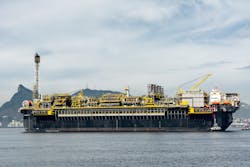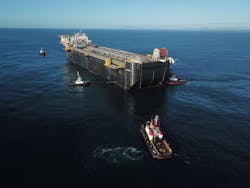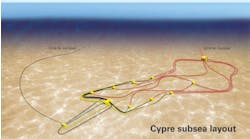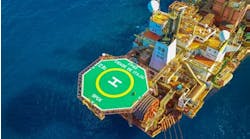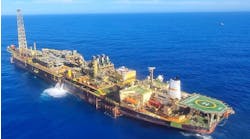Offshore staff
RIO DE JANEIRO – Petrobras has issued an update on its current field developments and production measures offshore Brazil.
Anchoring activities have finished for the box-shaped FPSO P-70 delivered earlier this year from the Far East. The facility will produce oil from the Atapu field in the presalt Santos basin: the offshore interconnection program is now nearing its conclusion.
Production should start before mid-year: the platform has an oil processing capacity of 150,000 b/d and a gas processing capacity of 6 MMcm/d.
In mid-March, the hull of the FPSO P-71 arrived in Espírito Santo for integration with other modules at the Jurong Aracruz Shipyard, with completion scheduled for 2022. The P-71 is designed to process 150,000 b/d of oil and 6 MMcm/d of gas.
Also in March, the four platforms currently in operation on the presalt Santos basin Búzios field achieved combined production of 790,000 boe/d.
During 1Q, the company conducted an extended well test on the Farfan area, 70 km (43 mi) off the coast of Sergipe - the first such test in ultra-deepwater off northeast Brazil. Petrobras plans to factor data on the behavior of the reservoir in production and the characteristics to support development of the field, part of the Sergipe Deep Waters project.
Despite the global recession caused by COVID-19, the company’s overall production was not materially impacted in the first quarter, averaging 2.606 MMboe/d.
Total output was 14.6% higher than the corresponding period in 2019, due to ramp-up of platforms that started-up in 2018 and 2019 (P-74, P-75, P-76, and P-77 on the Búzios field, P-67 and P-69 on Lula and P-68 on the Berbigão and Sururu fields).
Petrobras initially responded to the fall in global demand for oil by cutting its own oil production in April to 2.07 MMb/d and the capacity of its refineries from 79% to 60%.
However, demand for products was better than anticipated, so it has since opted to gradually restore oil production to an average level of 2.26 MMb/d.
As a result of COVID-19, Petrobras has reviewed planned stoppages scheduled for 2Q and will now defer these to later in the year, focusing for the time being on maintaining the minimum number of personnel require to sustain production and safe operations.
04/28/2020
